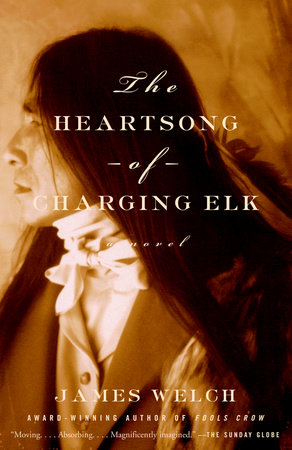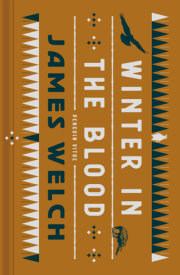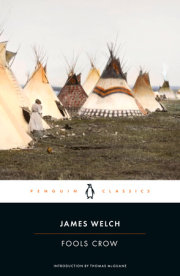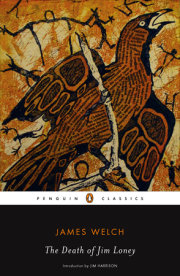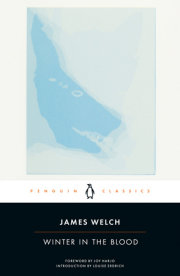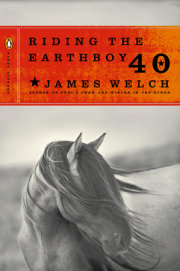Charging Elk opened his eyes and he saw nothing but darkness. He had been dreaming and he looked at the darkness and for a moment thought he hadn't come back. But from where? And where was he now?
He was lying on his back in the dark and he remembered that he had eaten soup twice during daylight. He had awoken and a pale woman in a white face covering had fed him soup. Then he awoke again and another woman with her face similarly covered gave him more soup. It was clear soup and it was good but he couldn't eat much of it. But the second time the woman gave him a glass of orange juice and he recognized it and drank it down. He liked the orange juice, but when he asked the woman for another glassful, she just looked at him above the face covering and shrugged her shoulders and said something in a language he didn't know. Then he fell back into sleep.
Now he propped himself up on his elbows and turned toward a light that entered the side of his eye. From its distant yellow glow he could tell that he was in a long room. He blinked his eyes to try to see better. Where was he? And why did the women cover their faces here? Gradually, his eyes grew stronger and he saw, between his eyes and the distant light, several lumpy shapes on platforms. He heard a harsh cough on the other side of him and he fell back and slowed his breathing. When the coughing stopped he pushed the covering that lay over him to one side and looked again toward the light. And he began to remember.
He didn't remember much at first, just the two women who fed him soup. But now he remembered the room he was in. He hadn't seen much of the room because he had been on his back on one of the white men's sleeping beds. It was a big high-ceilinged room with a row of glass globes lit by yellow wires. There were high windows on the wall opposite his sleeping bed. Through one window he could see the bare limbs of a tree, but the others were full of gray sky.
He remembered waking up once sometime and a man in a white coat was bending over him, his face also covered with a mask. He was pushing something small and cold against Charging Elk's chest. He didn't look at Charging Elk but Charging Elk glanced at him for just a second and he saw pieces of silver metal disappear into the man's ears. He became afraid and closed his eyes and let the man touch his body with the cold object.
How long ago was that? Before the women fed him soup? As he looked toward the yellow glow at the far end of the room, he remembered burning up with heat, throwing off the covers, struggling to get up, feeling a sharp pain in his side, and the two or three white men who held him down. He remembered trying to bite the near one, the one with the hairy face who roared above him and struck him on the forehead. Once, he woke up and he was tied down. It was dark and he grew cold, so cold his teeth chattered and violent spasms coursed up and down his back. He was freezing to death, just as surely as if he had broken through the ice on a river. He had seen the river for an instant, just a quick flash of silver in the darkness, and it was lined with bare trees, and tan snowy hills rose up on either side of it. But when he came up out of the river, it was light and he was in the sleeping bed in the big room and his back and side ached from the sharp spasms.
Charging Elk stared at the yellow light for a long time but he could remember nothing more because he could not think. He stared at the soft yellow light as though it were a fire he had looked into before, somewhere else, far away.
When he awoke again he lifted his head and watched the gray light of dawn filtering through the windows. A bird swooped down with high-lifted wings and lit on a ledge of one of the windows and Charging Elk recognized it. He had seen this kind of bird before. Sometimes it walked, always with many others of its kind, on the paths and cobblestones of the cities he had been in. When it walked its head bobbed and it made strange lowing sounds deep in its throat. He remembered a child chasing a band of these birds and how quickly they flew up and flashed and circled in unison, only to land a short distance away.
He had seen the big buildings of the cities--the houses that held many people, the holy places with the tall towers where people came to kneel and tell their beads, the big stores and small shops full of curious things. He had been inside a king's stone house with many beds and pictures and chairs made of gold. And once, in Paris, he had accompanied a friend who had been injured badly to a house full of many beds.
Charging Elk knew now that he was in a white man's healing house. And he thought he must have been there for quite a long time but he had no idea how long. Sometimes when he had awakened it had been light; other times, it had been dark. He had no idea how many sleeps he had passed there.
He was very weak--and hungry. He listened to his guts rumble and he wanted some meat and more of the orange juice. And some soup. He wanted sarvisberry soup, but he still didn't know where it had been that he had tasted this soup, or even that it was made of sarvisberries. He only knew that he wanted the taste of something familiar.
He heard a hollow clicking from a long way off, the only clear sound in an undercurrent of breathing, snoring, coughing, and moaning. As he listened to the clicking come nearer, he lifted himself up on his elbows and his body didn't seem as heavy as it had been in the dark.
The young woman glanced toward him, then stopped. Unlike the food women, she wore a stiff white cap with wings and an apron that came up over her shoulders. Beneath the apron, she had on a long gray dress with narrow sleeves. A flat gold cross hung from a chain around her neck. Charging Elk had seen this type of cross on other people and he almost knew where. He became interested in her.
Charging Elk opened his eyes and he saw nothing but darkness. He had been dreaming and he looked at the darkness and for a moment thought he hadn't come back. But from where? And where was he now?
He was lying on his back in the dark and he remembered that he had eaten soup twice during daylight. He had awoken and a pale woman in a white face covering had fed him soup. Then he awoke again and another woman with her face similarly covered gave him more soup. It was clear soup and it was good but he couldn't eat much of it. But the second time the woman gave him a glass of orange juice and he recognized it and drank it down. He liked the orange juice, but when he asked the woman for another glassful, she just looked at him above the face covering and shrugged her shoulders and said something in a language he didn't know. Then he fell back into sleep.
Now he propped himself up on his elbows and turned toward a light that entered the side of his eye. From its distant yellow glow he could tell that he was in a long room. He blinked his eyes to try to see better. Where was he? And why did the women cover their faces here? Gradually, his eyes grew stronger and he saw, between his eyes and the distant light, several lumpy shapes on platforms. He heard a harsh cough on the other side of him and he fell back and slowed his breathing. When the coughing stopped he pushed the covering that lay over him to one side and looked again toward the light. And he began to remember.
He didn't remember much at first, just the two women who fed him soup. But now he remembered the room he was in. He hadn't seen much of the room because he had been on his back on one of the white men's sleeping beds. It was a big high-ceilinged room with a row of glass globes lit by yellow wires. There were high windows on the wall opposite his sleeping bed. Through one window he could see the bare limbs of a tree, but the others were full of gray sky.
He remembered waking up once sometime and a man in a white coat was bending over him, his face also covered with a mask. He was pushing something small and cold against Charging Elk's chest. He didn't look at Charging Elk but Charging Elk glanced at him for just a second and he saw pieces of silver metal disappear into the man's ears. He became afraid and closed his eyes and let the man touch his body with the cold object.
How long ago was that? Before the women fed him soup? As he looked toward the yellow glow at the far end of the room, he remembered burning up with heat, throwing off the covers, struggling to get up, feeling a sharp pain in his side, and the two or three white men who held him down. He remembered trying to bite the near one, the one with the hairy face who roared above him and struck him on the forehead. Once, he woke up and he was tied down. It was dark and he grew cold, so cold his teeth chattered and violent spasms coursed up and down his back. He was freezing to death, just as surely as if he had broken through the ice on a river. He had seen the river for an instant, just a quick flash of silver in the darkness, and it was lined with bare trees, and tan snowy hills rose up on either side of it. But when he came up out of the river, it was light and he was in the sleeping bed in the big room and his back and side ached from the sharp spasms.
Charging Elk stared at the yellow light for a long time but he could remember nothing more because he could not think. He stared at the soft yellow light as though it were a fire he had looked into before, somewhere else, far away.
When he awoke again he lifted his head and watched the gray light of dawn filtering through the windows. A bird swooped down with high-lifted wings and lit on a ledge of one of the windows and Charging Elk recognized it. He had seen this kind of bird before. Sometimes it walked, always with many others of its kind, on the paths and cobblestones of the cities he had been in. When it walked its head bobbed and it made strange lowing sounds deep in its throat. He remembered a child chasing a band of these birds and how quickly they flew up and flashed and circled in unison, only to land a short distance away.
He had seen the big buildings of the cities--the houses that held many people, the holy places with the tall towers where people came to kneel and tell their beads, the big stores and small shops full of curious things. He had been inside a king's stone house with many beds and pictures and chairs made of gold. And once, in Paris, he had accompanied a friend who had been injured badly to a house full of many beds.
Charging Elk knew now that he was in a white man's healing house. And he thought he must have been there for quite a long time but he had no idea how long. Sometimes when he had awakened it had been light; other times, it had been dark. He had no idea how many sleeps he had passed there.
He was very weak--and hungry. He listened to his guts rumble and he wanted some meat and more of the orange juice. And some soup. He wanted sarvisberry soup, but he still didn't know where it had been that he had tasted this soup, or even that it was made of sarvisberries. He only knew that he wanted the taste of something familiar.
He heard a hollow clicking from a long way off, the only clear sound in an undercurrent of breathing, snoring, coughing, and moaning. As he listened to the clicking come nearer, he lifted himself up on his elbows and his body didn't seem as heavy as it had been in the dark.
The young woman glanced toward him, then stopped. Unlike the food women, she wore a stiff white cap with wings and an apron that came up over her shoulders. Beneath the apron, she had on a long gray dress with narrow sleeves. A flat gold cross hung from a chain around her neck. Charging Elk had seen this type of cross on other people and he almost knew where. He became interested in her.
Copyright © 2001 by James Welch. All rights reserved. No part of this excerpt may be reproduced or reprinted without permission in writing from the publisher.

